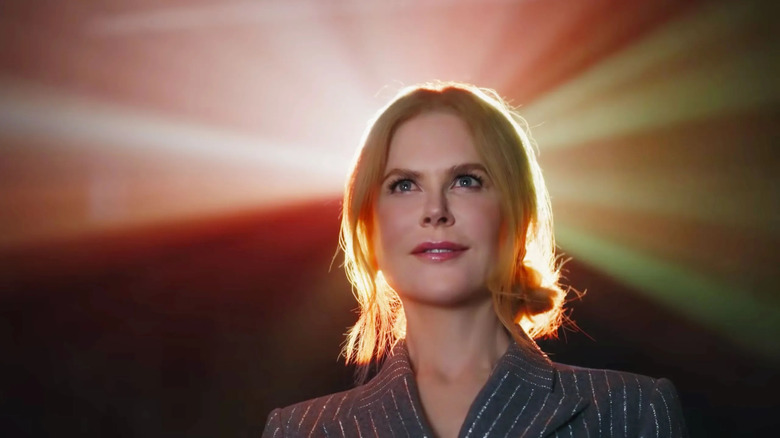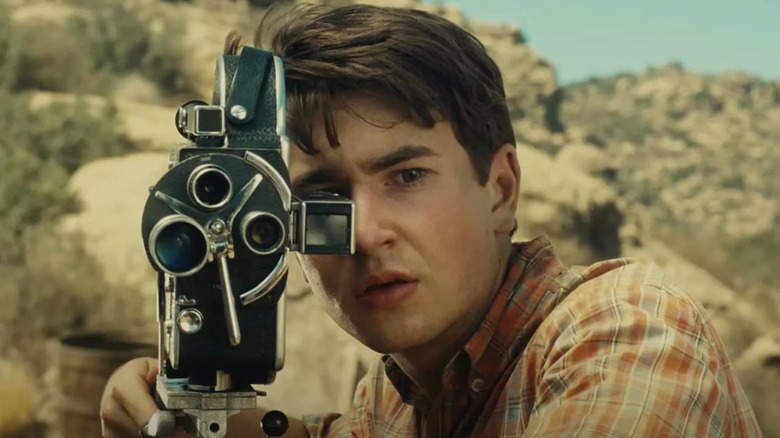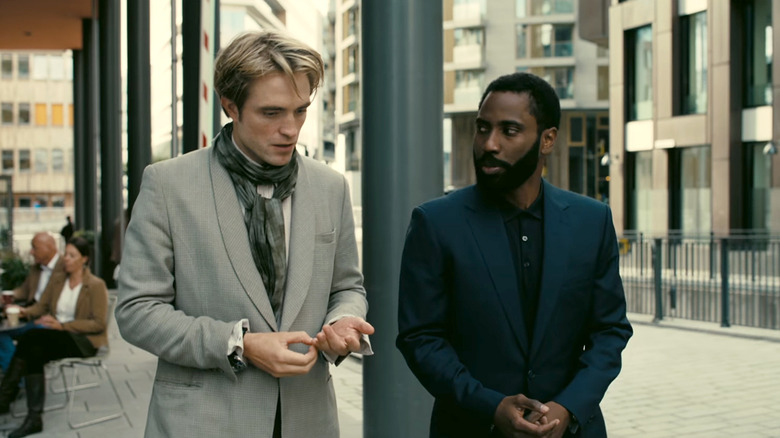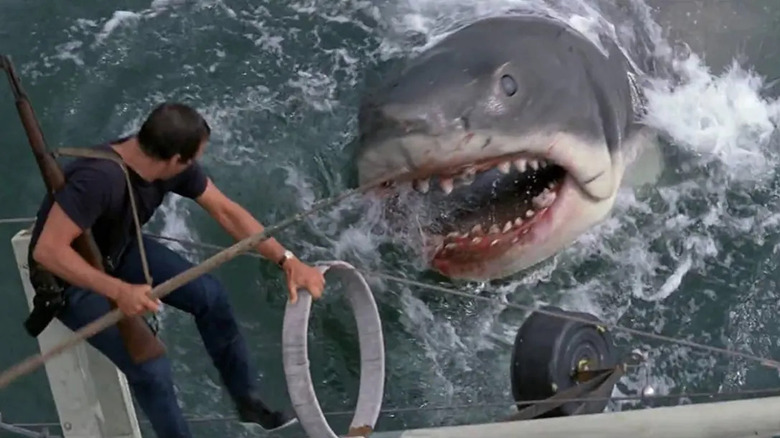Steven Spielberg Can't Be Right Or Wrong About Theaters Versus Streaming Because Everything Has Changed Too Much
In the New York Times yesterday, while discussing his upcoming semiautobiographical film "The Fabelmans," director Steven Spielberg repeated a common refrain: Please, please, please don't forget about theaters.
Spielberg had rightly been concerned about the life of movie theaters for many years. Back in 2013, Spielberg already saw the writing on the wall, pointing out that blockbusters were becoming bigger and bigger, while more adult dramas were falling by the wayside. He predicted that movie theaters would fall into a Broadway-style pricing system, with the "bigger" shows fetching higher and higher ticket prices, and the smaller dramas being more affordable. At that same time, Spielberg revealed that his 2012 film "Lincoln" — handily one of the filmmaker's best movies — was nearly an HBO release. Even in 2013, it seemed that theaters were destined to be the home of blockbusters exclusively.
In 2019, Spielberg courted controversy with his comments that films released on Netflix should not be eligible for Academy Awards. He felt that cinema, to his eye, was a theater-bound experience, and that the Academy Awards should remain only in the same purview. Anything released on a streaming service, he felt, no matter how much it resembled cinema aesthetically, should be bound to the Emmys by dint of their medium. Spielberg wasn't making any kind of qualitative judgment on Netflix movies, of course, nor was he pooh-poohing the notion that widespread access to great art was a bad thing. But he did feel that some lines should be more solidly drawn when it comes to cordoning off differing media. Film was film, he said, and TV was TV.
Come back, Shane
Now, in 2022, Spielberg returns to trumpet the theatrical experience. He sees a dwindling theatrical marketplace, and is far too attached tp the cinema experience to discourage anyone from seeking it out. As he watches audiences stay home for everything outside of only the largest action blockbusters, Spielberg, 75, wanted to gently remind people of the glorious magic of a shared theatrical experience. He said the following:
"I think older audiences were relieved that they didn't have to step on sticky popcorn. But I really believe those same older audiences, once they got into the theater, the magic of being in a social situation with a bunch of strangers is a tonic ... It's up to the movies to be good enough to get all the audiences to say that to each other when the lights come back up."
And Spielberg isn't wrong. The theatrical experience is glorious. The dark room and bright screen possesses an ineffable alchemy that draws in an audiences soul. When he complains later in the same article that streaming services should "foot the bill" to pay for longer, wider theatrical runs (as opposed to the current model of brief, small, week-long Los Angeles stints merely for Academy Awards qualification), it's his way of expressing genuine concern that streaming services are encouraging audiences to see cinemas as "lesser." He seems to feel that taking the theater away from film will do the medium harm.
Spielberg stages his arguments as a grim, lamentable prediction.
The saddest part, however, is that it's kind of already happened.
The COVID factor
Spielberg, it should be remembered, was one of the first directors to enjoy a world of nationwide releases. Prior to his film "Jaws," even the largest blockbusters were typically released in big cities first before touring the country over the next several months. Some movies could play in one city or another for years. Spielberg helped spearhead the a new distribution model where hundreds of theaters across the country would open a film on the same day. And lo, "opening weekend box office" was born.
This author grew up in Spielberg's world, right during the height of the multiplex boom. As a youth, I recall, there were screens everywhere, and tickets were cheap. We lived in theaters, multiplexes, second-run houses, the high and the low. And they were always busy! People, it seems, just went to movies more often. As a thought exercise, I looked up the 20th highest-grossing film of 1994, and found that "Grumpy Old Men" made $70 million. Adjusted for inflation, it made more money than "Black Adam." In 2022, "Grumpy Old Men" would be the 10th biggest film of the year.
What both I and Spielberg need to acknowledge, though, is that the world of widespread theatrical releases is now, and has been, contracting for a while. The contraction seemed to be moving slowly at first, but a yearlong theatrical closure brought on by COVID accelerated the process. Some people held out hope — remember when Christopher Nolan's "Tenet" was going to save theaters? — but many studios immediately shifted all their time and money toward their streaming services. Disney shifted Pixar releases to Disney+. "Black Widow" was given a very small theatrical window. A "Halloween" movie ran on Peacock.
The writing was on the wall. The future was streaming.
Spielberg vs. The Russos
In 2022, Spielberg — and other theater purists — hold out hope that audiences will eventually redouble and return. Bigger blockbusters, it is hoped, will draw people out, and that they will want to stay for smaller movies. That time has, sadly, passed. Spielberg still thinks that theaters are still the primary source of film consumption. They are not. Theaters are now the secondary venue — at least outside of "Top Gun" — and streaming is the first place people look.
Streaming services are not where studios "dump" stuff. Streaming services are the studios' darlings.
Studios worked very hard to build up their streaming catalogues. Moving a film from theatrical to Disney+ is not a loss for the studio. It's a win. At least for them.
This is not a declaration that Spielberg is wrong, wrong, wrong, however. Nor is it an argument for the power of streaming. One might recall Anthony and Joe Russo, the directors of "The Gray Man" and "You, Me and Dupree," making waves earlier this year when they stepped forward to reject the notion that theaters are "sacred spaces." They said that there is utterly nothing wrong with watching movies at home, and that we all need to just get over the idea that cinemas are important. They stand directly counter to Spielberg.
Personally, I agree with both. I agree with Spielberg that a theatrical experience is profound and important and irreplaceable. As someone who grew up in the age of VHS, though, the bulk of films I have seen I watched for the first time at home. Without home video, I would not have seen most of the world's classics.
The shark is eating the boat
What needs to be acknowledged is that the landscape has already changed too much for Spielberg to be right or wrong. It's simply different now. COVID shut down many theaters, and streaming rushed in to fill the void. In 2022, we are already living in a world where theaters are reserved for "Top Gun: Maverick." Audiences still gather in large numbers for a certain kind of big-budget tentpole, and there's no doubt that "Black Panther: Wakanda Forever" and "Avatar: The Way of Water" will rake in huge amounts of cash.
In the last three years, though, theaters changed from the premiere source for film, into being a supplement. Spielberg resents this. He pleas with all his might that theaters not be forgotten. He wants them to be used for more than just SFX spectacles. He might take hope in the success of a smaller horror film like "Terrifier 2" sneaking in the back door.
Theaters are the better place to see movies and always will be. They're also transforming into venues for blockbusters and little else. If the blockbusters stop drawing crowds — if the MCU ever earnestly dies out — then theaters may go with it.
Cinema is currently living through an extended inflection point. One that is as profound as when televisions were invented in the 1950s. Will cinemas survive? Most assuredly. Will they look anything like how they did 50, 20, or even five years ago? They will not. The landscape has already changed too much.
Whether that is good or bad will have to remain in the realm of personal taste.




